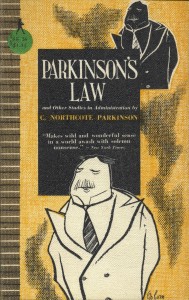Journalism needs a Parkinson’s Law (or, did Wolf Blitzer really ask that question?)
Somewhere in the middle of CNN’s ceaseless reporting of what it didn’t know about the shooting today at the Washington Navy Yard, in between Wolf Blitzer’s precise references to an upcoming news conference by “the President of the United States” (to clarify for all of those expecting the President of Bolivia), the anchor asked whether the black clothing reportedly worn by one of the gunmen told us anything.
“The shooter is said to be wearing all black. Can this provide clues to a motive?” – Wolf Blitzer, worst journalist on Earth
— Todd (@Todd_J) September 16, 2013
Yes, Wolf, it tells us the shooter’s blaze orange outfit was still at the cleaners.
C. Northcote Parkinson wrote an essay for the Economist in 1955, later expanded into the book “Parkinson’s Law,” which began with this line: “Work expands so as to fill the time available for its completion.” It’s important to note that this does not mean the amount of work actually accomplished grows; rather, the time needed to accomplish a given amount of work will grow.
This would appear to be true of breaking news coverage as well. A handful of facts can be stretched out over hours of live coverage — not merely repeated, but dissected and plumbed for deeper meanings. The more time available, the thinner the connection to what we used to call journalism.
Pretty sure I just heard Wolf Blitzer say, “that’s very, very distrubing, if in fact it is true.”
— John Taylor (@newspapereditor) September 16, 2013
I propose a new rule — call it Kroll’s Law, because, why not?
In live coverage of breaking news, facts expand to fill time until they change state from solid reporting to a gaseous substance.
I am not one to look longingly to the past, but breaking news like today’s shootings are a case for an older style of journalism — for AP’s alerts only when it has new facts to present. These are situations where live blogging — the Guardian’s are always the best — trumps TV news.
Wolf Blitzer is hardly to blame for the gaseous state to which CNN’s shooting coverage evolved. Presidential election nights give all networks a chance to demonstrate Kroll’s Law. Remember Megyn Kelly marching down to the Decision Desk on Fox to get an explanation for why the numbers would dare to disagree with Karl Rove? Or when Dan Rather turned the 2004 results into the March of the Metaphors?
Our ability to cover breaking news has exceeded the availability of news to be covered. Reporters and whole networks are turning into Parkinson’s “elderly lady of leisure [who] can spend the entire day in writing and dispatching a postcard to her niece in Bognor Regis.”

